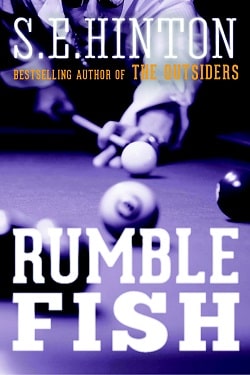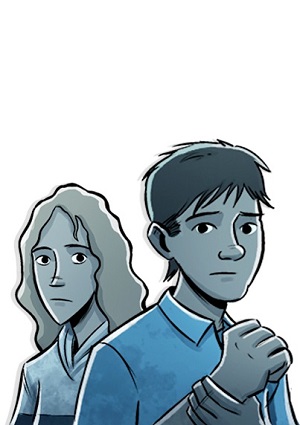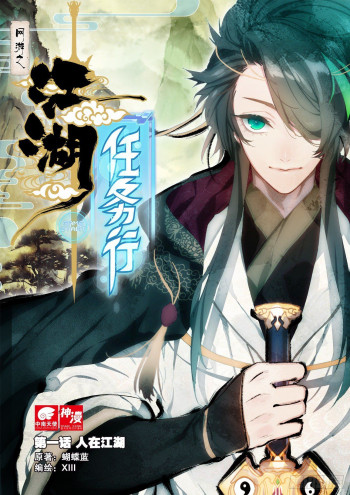Summary

Rumble Fish
by S. E. Hinton
Rusty-James is the number one tough guy among the junior high kids who hang out and shoot pool at Benny's. He's proud of his reputation, but what he wants most of all is to be just like his older brother, the Motorcycle Boy. Whenever Rusty-James gets in over his head, the Motorcycle Boy has always been there to bail him out. Then one day Rusty-James' world comes apart, and the Motorcycle boy isn't around to pick up the pieces. What now?
Like Hinton's groundbreaking classic The Outsiders, Rumble Fish was adapted into a movie by Francis Ford Coppola and remains as relevant as ever in its exploration of sibling relationships, the importance of role models, and the courage to think independently.
.
Read
Rumble Fish on http://kissnovel.net
Martial Peak Reviews
Rumble Fish, written by S. E. Hinton, is a poignant exploration of adolescence, identity, and the complexities of sibling relationships. Set against the backdrop of a gritty urban landscape, the novel follows the life of Rusty-James, a junior high student who prides himself on being the toughest kid in his neighborhood. However, beneath this tough exterior lies a deep-seated yearning for connection and validation, primarily through his relationship with his enigmatic older brother, the Motorcycle Boy.
From the outset, Hinton's narrative immerses readers in Rusty-James' world, where the allure of toughness and reputation reign supreme. The author skillfully captures the essence of teenage bravado, showcasing how Rusty-James navigates the treacherous waters of peer pressure and the desire to prove himself. His interactions with his friends at Benny's pool hall serve as a microcosm of the struggles faced by many adolescents—balancing the need for acceptance with the fear of vulnerability.
One of the most compelling aspects of Rumble Fish is the relationship between Rusty-James and the Motorcycle Boy. The Motorcycle Boy, with his cool demeanor and almost mythical presence, represents an ideal that Rusty-James aspires to embody. He is not just a brother but a role model, a figure of strength and independence. Hinton deftly illustrates how Rusty-James' reliance on his brother shapes his identity, creating a dynamic that is both inspiring and suffocating. The Motorcycle Boy's eventual absence forces Rusty-James to confront his own insecurities and question the very foundation of his self-worth.
The theme of identity is intricately woven throughout the narrative. Rusty-James grapples with the expectations placed upon him by his peers and the shadow cast by his brother. Hinton poignantly captures the struggle of many young people who feel the weight of their surroundings and the pressure to conform. As Rusty-James faces challenges without the Motorcycle Boy's guidance, he embarks on a journey of self-discovery, ultimately learning that true strength comes from within.
Hinton's writing style is both raw and evocative, perfectly suited to the emotional landscape of the story. The dialogue is authentic, reflecting the vernacular of the time and the characters' backgrounds. This authenticity enhances the reader's connection to the characters, making their struggles and triumphs feel all the more real. The stark imagery of the urban setting serves as a backdrop to the internal conflicts faced by Rusty-James, mirroring the chaos of his emotions.
Another significant theme in Rumble Fish is the concept of role models and the impact they have on our lives. The Motorcycle Boy embodies the ideal of independence and cool detachment, yet his own struggles with identity and purpose reveal the complexities of hero worship. As Rusty-James navigates his own path, he learns that role models are not infallible; they are human, with their own fears and flaws. This realization is a crucial turning point in Rusty-James' journey, as he begins to forge his own identity rather than merely imitating his brother.
The novel's exploration of independence is particularly resonant. Hinton emphasizes the importance of thinking for oneself and making choices that reflect one's true self. Rusty-James' journey is not just about finding his place in the world; it is about understanding that he has the power to shape his own destiny. This theme is especially relevant for young readers who may feel lost or pressured to conform to societal expectations. Hinton's message is clear: while it is natural to seek guidance from others, the ultimate responsibility for one's life lies within.
In comparison to Hinton's earlier work, The Outsiders, Rumble Fish delves deeper into the psychological aspects of adolescence. While both novels explore themes of friendship, loyalty, and the quest for identity, Rumble Fish takes a more introspective approach. The characters are not just defined by their social groups; they are complex individuals grappling with their own demons. This depth adds a layer of richness to the narrative, making it a compelling read for both young adults and adults alike.
The impact of Rumble Fish extends beyond its pages. The novel's adaptation into a film by Francis Ford Coppola further solidified its place in popular culture, introducing Hinton's powerful storytelling to a broader audience. The film captures the essence of the book while adding a visual dimension that enhances the emotional weight of the story. However, it is the novel's introspective nature that truly resonates, allowing readers to engage with the characters on a deeper level.
In conclusion, S. E. Hinton's Rumble Fish is a masterful exploration of the tumultuous journey of adolescence. Through the lens of Rusty-James' experiences, Hinton addresses universal themes of identity, role models, and the quest for independence. The novel's raw and authentic portrayal of teenage life, coupled with its rich character development, makes it a timeless classic that continues to resonate with readers today. Hinton's ability to capture the complexities of youth and the importance of self-discovery ensures that Rumble Fish remains a relevant and impactful work for generations to come.









![Meet Me Today [ Tia ]](/upload/pic/manga/meet-me-today---tia--.jpg)














Reviews 0
Post a Reviews: